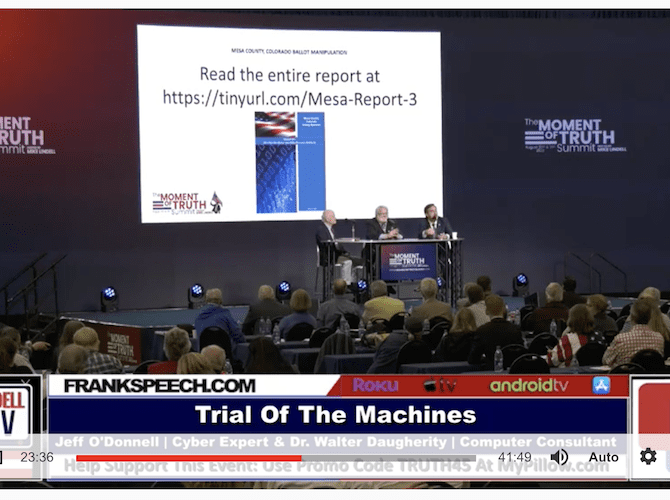Pennsylvania’s GOP Senate Primary is Over, But Anti-Voter Impacts Linger

(U.S. Supreme Court conference room. Photo credit: supremecourt.gov)
On Friday, June 3, Pennsylvania’s Republican U.S. Senate primary ended as David McCormick, a hedge fund manager, conceded to Dr. Mehmet Oz, a celebrity physician endorsed by Donald Trump, after McCormick concluded that a recount would not reverse Oz’s 900-vote lead.
Before that contest slips into memory, two developments that surfaced during McCormick’s post-primary challenge of the initial results are worth noting, as they are political bellwethers for 2022’s remaining primaries and future elections.
The first development is at least one U.S. Supreme Justice in the court’s conservative majority, Samuel Alito, has signaled that he would not count all returned absentee ballots.
As the primary’s recount began, Alito issued an order, without explanation, in a lawsuit about another Pennsylvania election, that concerned a category of ballots that were in play in the 2022 GOP Senate primary: absentee ballots where the return envelope had not been dated.
Alito said ballots in the undated envelopes should not be counted. In that case, a federal appeals court had held these ballots should count, citing the 1964 Civil Rights Act. The lower court ruled that such technicalities were immaterial to a voter’s eligibility to cast a ballot.
“For those who are curious, Ritter v. Miliori itself ha[s] muddied the legal rules for the recount,” Tabatha Abu El-Haj, a Drexel University law professor, wrote on ElectionLawBlog.org on May 31. “This is because the Third Circuit’s decision does not, strictly speaking, bind Pennsylvania officials. The PA Department of State, however, does believe its underlying logic should be applied, and has issued an advisory opinion urging counties to segregate and count.”
Such ambiguities invite Supreme Court review. It would be a big deal if the Court revisited the merits of the 1964 Civil Rights Act as it pertained to new bureaucratic requirements that have been added to the voting process in recent years – most often by GOP-run state legislatures.
McCormick had filed two lawsuits during the recount. Both sought to enlarge the volume of ballots to be recounted, which is a typical tactic for trailing candidates. In his first lawsuit, the GOP candidate, ironically, took the position seen in many lawsuits filed by Democrats: to count as many ballots as possible, including some 860 undated mailed-out ballots.
On Thursday, June 2, a Pennsylvania court ruled in his favor. Because McCormick conceded on the next day, Friday, June 3, the issue did not return to Alito, who vets appeals from the state.
The second noteworthy development concerns McCormick’s second lawsuit, which made stolen election claims – much the same clichés that have been promoted by Trump since his 2020 loss to Joe Biden and debunked by numerous Republican and Democratic election officials.
That lawsuit, which was to be heard on Monday, June 6, said, “Petitioners believe, based on information they consider reliable, that fraud or error, although not manifest on the general return of votes, was committed in the computation of votes cast, in the marking of the ballots, in the canvassing of the votes cast on the machines.”
In other words, the lawsuit, without presenting proof, suggested that the GOP primary was riddled with forged ballots, malfunctioning machinery and corrupt officials who let errors stand when reconciling the preliminary vote totals – the so-called canvassing process.
The evidence cited was a list of hundreds of precincts in 12 counties, where McCormick wanted to examine ballots. Bluntly, this was a fishing expedition built atop smearing the process. What’s notable is a U.S. Senate candidate had no hesitation to inject falsehoods into a public process, certifying election results, and the political discourse. This episode is a reminder of what may unfold if Republicans lose in 2022’s general election this fall.
There’s a second takeaway from McCormick’s loss, which also provides an important context for understanding close results. Unless large volumes of uncounted ballots emerge, seemingly close election margins of nearly 1,000 votes or more are almost never reversed.
In the Senate primary, Oz initially led McCormick by more than 900 votes. At first glance, the conflicting state and federal court orders surrounding undated absentee ballot envelopes seemed to muddy the recount. But to seasoned recount attorneys, McCormick’s moves were just as predictable are they were unlikely to suffice.
“If you’re way behind, you just want to count everything,” Chris Sautter, an election lawyer specializing in recounts, said before McCormick conceded.
There are several reasons why McCormick was not likely to reverse Oz’s lead, he said. First, no sizeable blocks of uncounted votes had surfaced – which would have occurred by this stage in the process. Notably, as Pennsylvania’s counties reported their recount totals, results barely changed by more than a single digit for either candidate, local press reported.
Next, McCormick and Oz were running in a crowded field. Both men received slightly more than 31 percent during the primary. In general, the last ballots counted (usually from overseas and military voters) tend to break along the same lines as earlier votes. Thus, any remaining or uncounted votes would be allocated among all the candidates, steepening McCormick’s path.
But these fact-based realities didn’t stop McCormick from attacking voters and the process – before conceding and ducking his day in court – which leaves the falsehoods dangling.
The soon-to-be-forgotten primary has offered some troubling takeaways. False attacks on voters, election officials and voting technology continue to be fodder for some Republicans. And should the Supreme Court revisit absentee ballot rules, Alito has signaled that its conservatives are not likely to give voting from home the benefit of the doubt.






